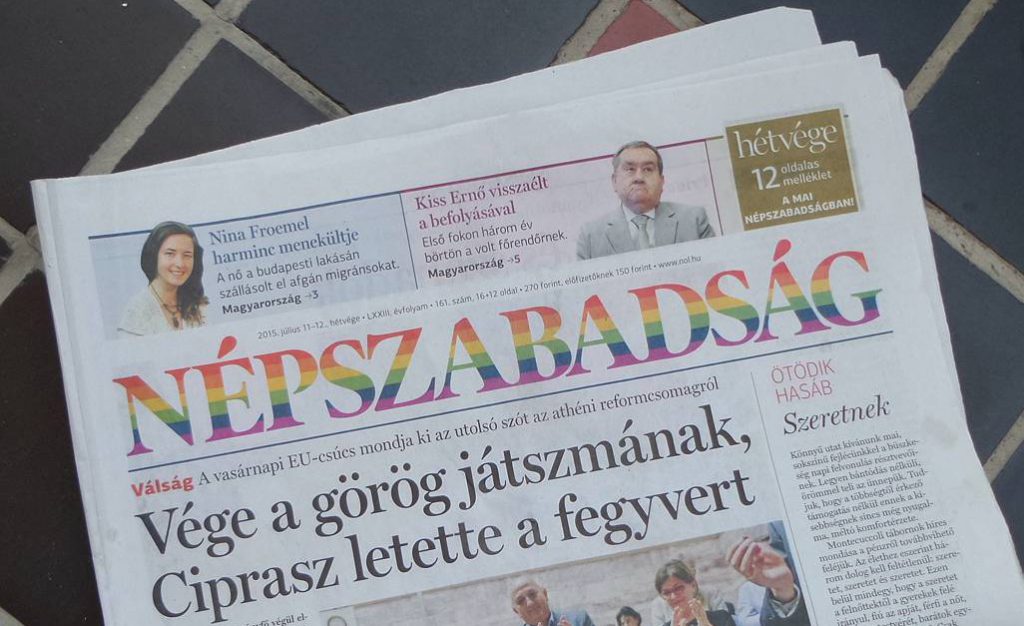Since 2010, Hungarian Prime Minister Viktor Orbán has been slowly dismantling the country's independent media until there is only voice left: his own. Diana Maria Prisecaru argues that thirteen years of carefully crafted messages has gifted Orbán the grassroots movement he always wanted
Media freedom is under attack in Hungary. The government has seized 80% of the press. The Media Council, an organisation that should exist to protect media freedom, has become merely another vehicle for Orbán to consolidate power. Media editors now either offer up what the Government wants to hear, with scant regard for facts, or risk being shut down, as recently happened with Tilos Rádió.
Hungarian media has lost its objectivity. It has become a tool through which Orbán and his Fidesz party spread their illiberal and anti-gender discourse. A free media – even a flawed one – offers marginalised people the opportunity to be seen and heard. But with the loss of media objectivity, the powerless in Hungary have lost their voices. Anti-gender discourse has made a resounding return to Hungarian media. Chillingly, it now risks becoming the default mode.
Illiberalism arose in Eastern Europe when liberalism's promises of riches were revealed as a sham. An open market brought only frustration, mass migration and the rise of nationalism.
Illiberal leaders like to claim they represent the will of the majority. They exploit public disenchantment with the political, economic and geopolitical situation. We see this in Orbán’s fight against everything he considers 'western'. But we see it most acutely in his choice of 'gender ideology' as public enemy number one.
Orbán resists everything he considers 'western' – in particular, the concept of 'gender ideology'
Paradoxically, Orbán blames people’s suffering on those who fight for gender equality and the rights of sexual minorities. He advocates instead for a return to tradition. These changes are part of a general policy that aims to demolish pluralism. In this scheme, the media plays a central role.
The Orbán government's stranglehold on the media allows it to suppress dissenting voices, and ensure only Fidesz messaging prevails. Orbán created two institutions, the National Media and Information Communications Authority, and the Media Council, as mouthpieces of his own government. Indeed, the presidents of both are Fidesz party members. These institutions ensure that all content in print and online is broadly supportive of the government. They also exert strict control over access to information for those critical of the government.

Journalists from government-critical media, for example, are not allowed in Parliament, which of course undermines their credibility. Newspapers such as Népszabadság, which published criticism of Orbán, now cease to exist. Orbán-supporting Lánchíd Rádió, on the other hand, was given the opportunity to expand.
But Orbán's control over the media goes even further than simply limiting government-critical media access to information and funding. Since 2010, his government has restricted the representation of LGBTQ people in the media, and encouraged antagonism towards the Pride movement. This about-face appears even more striking when we consider that just a year before Orbán was elected, Hungary legalised same-sex partnerships. Now, same-sex couples wanting to adopt need the approval of the Secretary of Family Affairs.
Hungary's government advocates for a 'traditional' society. In 2020, for instance, the Ministry for Families urged:
Let us not give up our privileges over some misinterpreted fight for emancipation!
Katalin Novák, Hungarian Minister for Families, december 2020
In a country in which stereotypes and traditional values abound, limiting people’s options makes it easier to align them with your perspective. The government advocates only one option, and claims that the majority supports it. But is the government telling the truth, or just their version of it?
In 2022, the Hungarian government held a referendum on 'child protection'. The true aim of this referendum, however, was to limit the presence of LGBTQIA+ information in the media and the education system. In the event, the widespread mobilisation of NGOs stopped the referendum from passing. Regardless, 98% of the people who did vote supported the government.
A recent phenomenon that stoked this setback in gender rights was the 2020 Covid pandemic. The crisis increased the incidence of gender-based domestic violence, and voices in Hungarian media began to argue that women should spend more time at home. In Hungary, the effects of the pandemic were exacerbated by the government-supported anti-gender movement. By controlling the country's media, Orbán is managing to shape national discourse about what the majority of people want.
Fidesz brainwashing has made Hungarians believe that sexist stereotypes are true, and defined all citizens by reductionist traits
Fourteen years of exposure to only one type of message has influenced Hungarians' worldview. It has made them believe that sexist stereotypes are true; and defined all citizens by reductionist traits. Orbán helps his supporters make sense of the world he created, and those supporters rally round him. Orbán and his party are now puppeteers of the media – and therefore the puppeteers of public discourse. As long as the opposition media remains in chains, Orbán's illiberal ideas will continue to sound legitimate.
No.35 in a thread on the 'illiberal wave' 🌊 sweeping world politics

This blog piece was written for the course 'Gendering Illiberalism', co-designed and co-taught by Andrea Pető (with TA Irfana Khatoon) and Alina Dragolea (with TA Oana Dervis) sponsored by CIVICA alliance universities Central European University (CEU) and the National University of Political Studies and Public Administration (SNSPA).